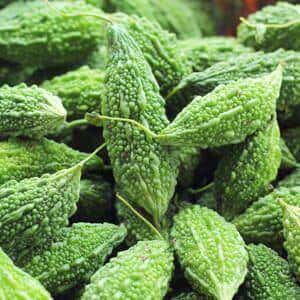
An Indian fruit in the same Cucurbit family as cucumber and squash has researchers excited. The plant, Momordica charantia, is known in India as karela and elsewhere as bitter melon.
Ayurvedic medicine practitioners have used it for thousands of years. Most often, they recommend this Indian fruit to treat conditions that appear to be related to diabetes.
Indian Fruit Studied for its Effects on Cancer:
Now, scientists at St. Louis University have found evidence that M. charantia may have activity against some cancer cells (Cell Communication and Signaling, Oct. 21, 2019). Specifically, the investigators considered how it affects oral cancer cells. They conducted tests in tissue culture and in animals that showed a 50 percent reduction in cancer cell growth. Bitter melon extract inhibits the main metabolic pathways these cells utilize. As a result, it blocks their ability to get energy from either sugar or fat.
Other Research on Bitter Melon to Fight Cancer:
This is not the first study to identify M. charantia as a promising source of anti-cancer compounds. Previously, scientists reviewed the existing studies published in various journals and concluded that investigators should continue their research on this Indian fruit (Seminars in Cancer Biology, Oct. 2016). In addition, they reported on the potential interactions the extract might display with drugs prescribed to treat cancer.
The Next Step:
Success in animals and in test tubes is only the first step, however. Subsequently, researchers will need to conduct clinical trials to see how well bitter melon works in human cancer patients. That will be more difficult to assess.
On the other hand, since the extract blocks abnormal sugar metabolism by cancer cells and also appears to boost immune cells’ anticancer activity, we can expect interesting results (Cancer Prevention Research, April 2018). Recently, scientists have identified four cucurbitane compounds that kill cancer cells (Journal of Natural Medicines, Jan. 2020). Even more interesting, these natural chemicals also protect healthy pancreatic cells from toxicity.
Citations
- Sur S et al, "Inhibition of the key metabolic pathways, glycolysis and lipogenesis, of oral cancer by bitter melon extract." Cell Communication and Signaling, Oct. 21, 2019. https://doi.org/10.1186/s12964-019-0447-y
- Raina K et al, "Promise of bitter melon (Momordica charantia) bioactives in cancer prevention and therapy." Seminars in Cancer Biology, Oct. 2016. DOI: 10.1016/j.semcancer.2016.07.002
- Rao CV, "Immunomodulatory effects of Momordica charantia extract in the prevention of oral cancer." Cancer Prevention Research, April 2018. DOI: 10.1158/1940-6207.CAPR-17-0379
- Yue J et al, "Four new cucurbitane-type triterpenes from Momordica charantia L. with their cytotoxic activities and protective effects on H2O2-damaged pancreatic cells." Journal of Natural Medicines, Jan. 2020. DOI: 10.1007/s11418-019-01336-1

